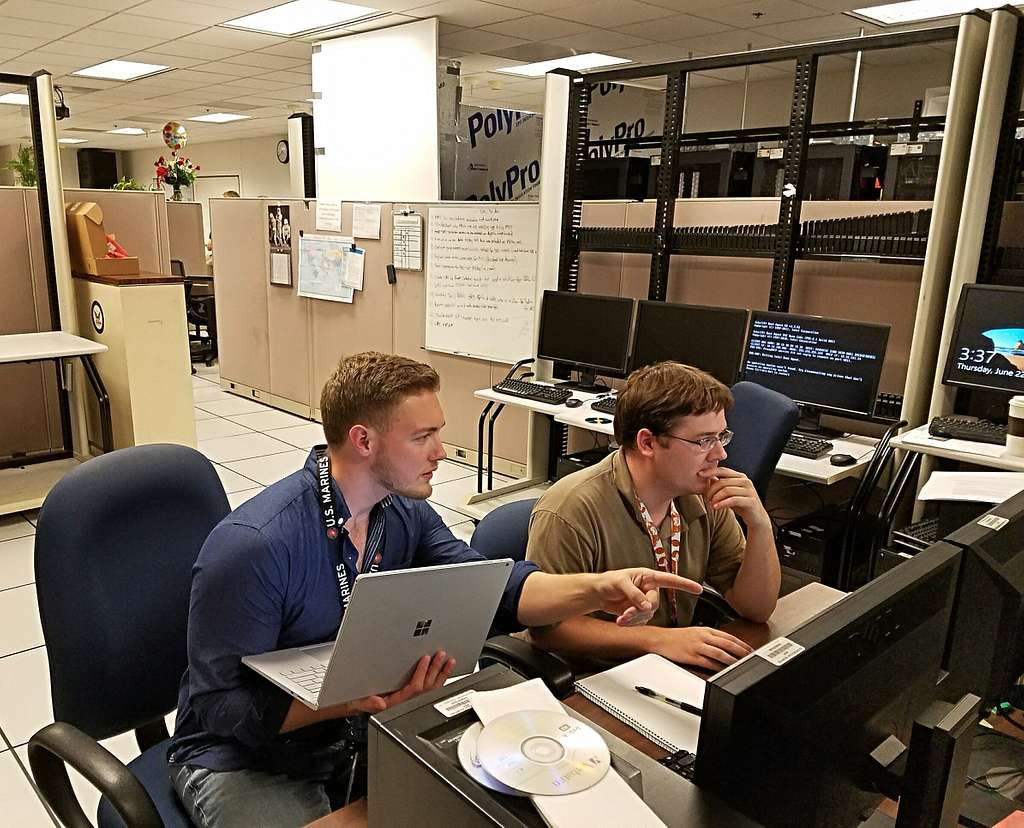Suppose you have considered application engineering as your future career. In that case, it is crucial to thoroughly understand how to become an application engineer, what this job requires, and if it is a good fit for you.
Throughout this article, we will provide valuable information and guides related to this specific career.
Overview of Application Engineer
So, what’s it like to be an application engineer? In this section, you will understand more about the daily tasks of an application engineer, the types of this position, and the differences between them. When you know what they do, you will understand why certain skills and knowledge are necessary.
Who Is An Application Engineer?
An application engineer’s typical job is designing, developing, and testing different types of computer application software after that software is launched. They are the ones who work on the software issues and fix them.
One special thing about application engineers is that they not only work on the software technically but also listen to customers’ feedback to improve it.

What Does an Application Engineer Do?
As mentioned above, an application engineer works with technical teams and customers. Here are some works they need to do:
- Testing and improving a software’ functions after launching;
- Database analyzing and designing;
- Guiding programmers;
- Upgrading hardware
- Supporting clients technically;
- Learning about customers’ needs to advise them on the suitest product and to boost sales;
- Helping clients generate software applications to increase operational efficiency.
Types of Application Engineers
- Software Developers: who are responsible for the whole process of creating new software;
- Software Testers: who test the software to make sure it’s functional;
- Application Developers: whose work is to evaluate, maintain, and develop software products for specific systems like smartphones, PCs, tablets, etc.

Skills for an Application Engineer
There are several skills an application engineer needs. The list below names a few, but we will discuss those in more detail later.
- The ability to focus
- Communication skills
- Team working skills
- Programming skills
- Organization skills
- Stress handling skills
- Hard skills
Working Environments
A typical application engineer works in a company or government agency’s office with fixed working hours. However, the work hours might increase when it needs to.
How To Become An Application Engineer
To become an application engineer, individuals must have specific skills and knowledge. In the detailed guide below, we will discuss the skills you need to have, the program you are required to take, and some successful tips in this career. Moreover, we can also show you how to prepare your best before an interview to increase your chances of getting hired.
1. Identify the Skills
Application engineering requires hard skills and various soft skills as they need to work in the tech team and with customers. Without these skills, it would be much more challenging for them to perform their best at work.
Here are some skills an application engineer needs, and we will divide them into 2 groups: hard skills and soft skills.
Hard Skills
To do the main work as an application engineer, you need to own these crucial skills:
- Java
- SQL
- ASP
- .NET
- Quality Assurance
- Quality Assurance
- Data Analysis
- CATIA V5 or NX
- Understanding Database management
- Program testing program
- SQL and C programming languages
- Being able to use logic analyzers and application servers

Soft Skills
- Being Meticulous: The work of application engineers always requires them to be meticulous enough to pay attention to the smallest details.
- Teamworking: Most application engineers work together in a team rather than alone, so teamwork is a super important skill for them.
- Communicating: The ability to discuss a topic and convey an opinion clearly and harmoniously can help them do a better job in a shorter time.
- Technical Supporting: It is a must for application engineers to be able to support and fix customers’ technical issues technically. Besides, they also need to understand server availability, server speed, and processor speed.
- Problem-Solving Skills: There will always be issues for application engineers to fix, so this skill is helpful.
If you feel like you currently do not have all of these skills, especially soft skills, it will help to practice them as soon as you can. It is also a good idea to take courses to improve them.
Remember that it’s not easy to be perfect right when you first try to find the first job, so an open mind and the eagerness to learn is another soft skill that helps you gradually possess other skills.
For hard skills, there is no solution for them other than to take proper training and courses. We will cover this whole topic in the next section.

2. Formal Training/Courses to Pursue
To become an application engineer, individuals must pursue professional courses or formal training. Moreover, application engineering students also need to finish Mathematics, Physics, and Chemistry with high achievement.
There are different entrance examinations an application engineer needs to take, namely JEE Main, JEE Advanced, SRMJEEE, VITEEE, BIT SAT, and WBJEE.
For the Bachelor’s degree, students can take One of these programs:
- Bachelor of Computer Administration (BCA)
- Bachelor of Technology in Computer Science
- Bachelor of Technology in Computer Engineering
- Bachelor of Technology in Computer Science and Engineering
- Bachelor of Technology in Information Technology
- Bachelor of Technology in Electronics and Communication Engineering.
In case you want to get a job easier and have the opportunity to get into a higher position at work in the future, consider studying further for a Master’s degree after getting your Bachelor’s degree.
For those who want to pursue a Master’s degree, the most-known programs they can consider are:
- Master of Technology in Computer Science
- Master of Technology in Computer Engineering
- MCA (Bachelor of Computer Administration)
- Master of Technology in Information Technology
- Master of Technology in Electronics and Communication Engineering
- Master of Technology in Computer Science and Engineering
Besides these programs, it always helps to get the certification with programs like CSDA (Certified Software Development Associate). Hiring managers appreciate this certification, and the most important thing about it is that it will help enhance the quality of your work.
When can you apply for it? Students who have already graduated can easily apply for it. But if you are a final-year student, you can apply for it if you pass the required written exam score.
Participate in a research project to take a step further during your studying time.
3. Build Resume
Your resume may be the first thing the HR team knows about you. So, please do not waste this opportunity to impress them with different aspects.
It is a must to let them know the related professional training and courses you already took and your degree. If you achieved higher ranking results in your programs, do not hesitate to include that matter.
Besides, do not undervalue the importance of soft skills as this job requires so much interaction. So, spend one section of your resume discussing your soft skills and describing them as short and on-point as possible.
We know some students who used their knowledge in application engineering to work with other students to create a new software product.
Even though students’ projects are not as professional and effective as those of professionals, you can write it in your resume if the product you worked on is effective and helpful enough.
Remember to keep the resume focused, appealing, and short but still convey the points. Suppose you are not confident about creating a resume. In that case, it is suggested to ask a senior to help you, do thorough research about a professional resume, or take advice from a professional.

4. Explore Internship Opportunities
An internship is not always required, but it is a great step to help you explore the career you will work with soon. Throughout the internship, you will have the chance to face the work in real life and interact with coworkers and possibly clients.
Another good thing about an internship is that it allows you to find out what type of work as an application engineer is most suitable or if you need to improve your skills in certain aspects. Knowing what you want allows you to apply for a position that fits you better later.
If you perform well during your internship, you can continue working for the company after your internship ends. So, if you like the company and its environment, this can be a good chance to be an application engineer without continuing to search.
You can find internship opportunities from companies of different scales because many top-notch tech companies and startups offer this chance to students. However, it is up to you to decide whether to apply for an internship because it is not mandatory.

5. Find Jobs and Apply
Once your resume is ready, it is time to search for a career position to apply. Companies and organizations use various platforms to find employees, and you can go to these sites to find your desired position.
Some platforms you can think about are LinkedIn, LinkUp, Monster, CareerBuilder, Simply Hired, Snag, and GlassDoor. It will help if you apply to multiple companies to increase your hiring chances.
Another smart thing to do if you do not know much about the company you are considering applying to is to read information about them first, do some research on Google or social platforms, or read the review of an ex-coworker.
By doing detailed research, you would have a deeper understanding of a company’s work environments, company culture, rules, salary, working hours, etc., to decide whether it is a good fit for you.
6. Prepare for Interview
It is always smart to prepare for the interview long before you have an offline or online interview. For those who have never had an interview (through a previous part-time job, for example), practicing answering interview questions would help.
It would be best to remember a few keys for passing an application engineer interview. First, you must prepare a self-introduction script and remember the important details. Next, understand clearly what specific work you need to do as an application engineer.
While given an interview, answer and ask questions professionally, and if better, subtly show them your soft skills, like communication and idea-delivering skills.
Companies always want to work with people who have certain knowledge about them. Therefore, spend some time learning as much information about the organization that you are going to have an interview with.

Tips:
- If you know a senior application senior or a hiring manager who hires people in the same field, for example, a friend or a relative, ask them for advice;
- Do research on frequently asked questions in interviews for your desired position;
- Dress up professionally;
- Do a mock interview online to get an idea of how it actually goes. There are now online mock tests that you can consider.
7. Landing a Job
After passing one interview or more and receiving their offer letters, it is up to you to choose the most suitable company. Your first job should ideally have an environment that allows you to learn from other seniors and grow your efficiency.
Tools for Application Engineers
Like other engineers in the field, an application engineer needs tools to work. These tools help them to understand the inner state of applications at a deep level.
For instance, when the API is slow, they must determine why and how this problem might affect customers.
One of the tools you can consider is SolarWinds Observability. This product can provide insights into understanding the internal state of the software. It also helps you to access data like logs, metrics, and traces to understand availability, service relations, and dependencies.
Job Outlook and Salary
The need for application engineers has been growing with the significant growth of technology and application development in the last decade. It is not going to stop growing any time soon.
The salary of an application engineer – like most career positions there are – relies heavily on geographic locations and experience. This career has a good wage compared to the average income of that region or nation.
In the US, application engineers can earn around $110,000 per year. Some companies also offer people working in this field extra benefits, namely health insurance, and even stock options.
FAQs
Is Application Engineering a Good Career?
With the consistent growth of technology, professional application engineers can find good positions with good salaries and opportunities to grow.
What is the Path of an Application Engineer?
The path for application engineers includes two main milestones: junior application engineer and senior application engineer.
Junior application engineers are the ones who design, build, analyze, develop, and test the software application, as well as do research related to the process of software development.
Senior application engineers, on the other hand, with more experience and knowledge, can do everything a junior can do and can also work with clients, plan further projects, and improve the software based on clients’ feedback and needs.
Is an Application Engineer the Same as a Software Engineer?
The two are related but are not the same. Software engineers work with a software product’s inner work, create its algorithms, and test the software before launching it.
On the other hand, application engineers test the software’s effectiveness and usability after it is already released to the market.
What Majors Can You Take Part in to Become an Application Engineer?
A few majors you can take part in to become an application engineer are computer science, computer engineering, software engineering, artificial intelligence (AI), bioinformatics, and information technology.
Conclusion
With all the information in this article, we are confident that you now understand this career more to decide whether it is right for you.
It might initially seem intimidating to see the long list of requirements, skills, and knowledge to be a good application engineer. But if you are interested in this career, the proper training and courses will gradually bring you closer to your goal.
